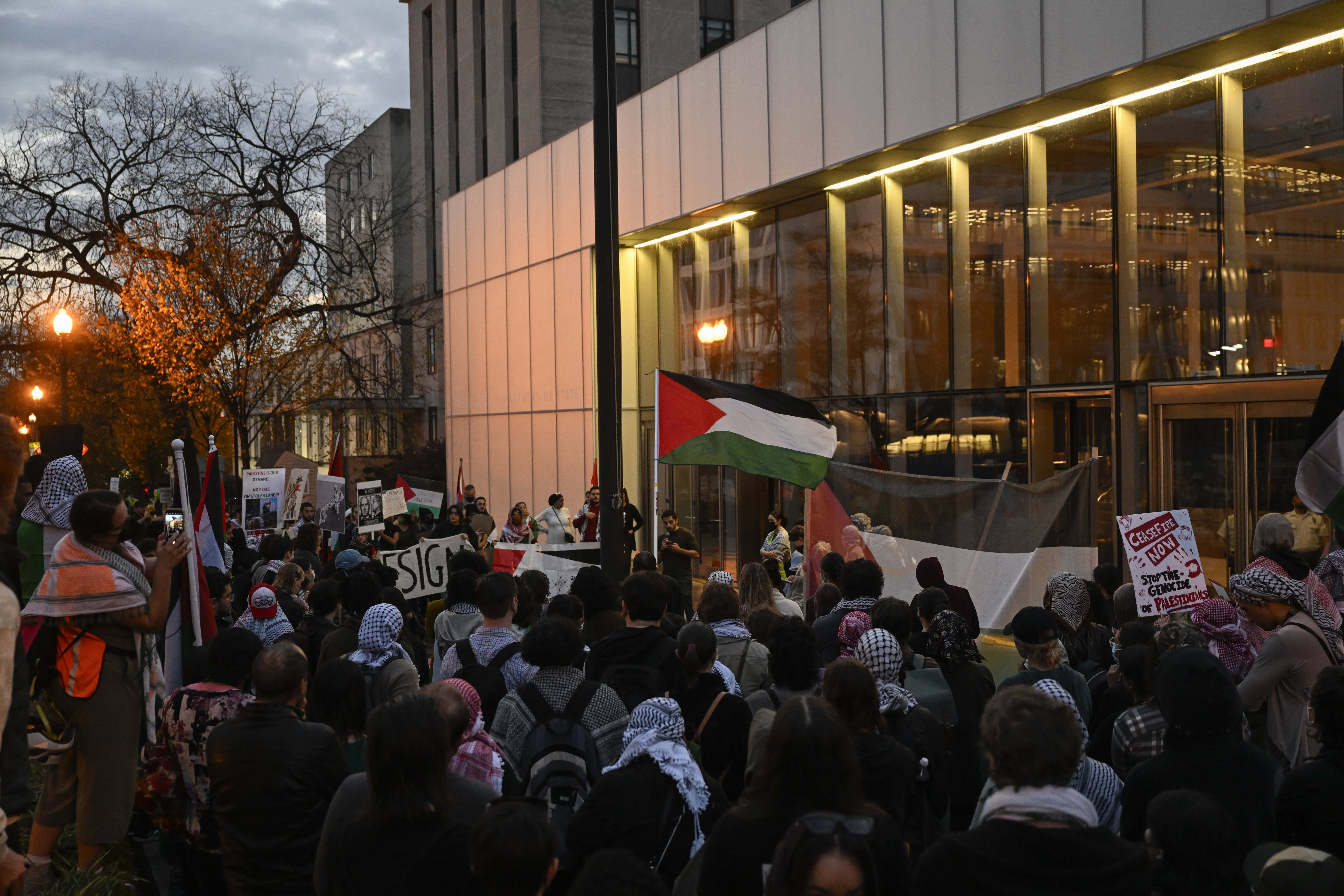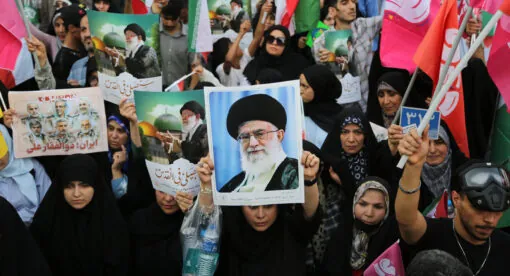Editor’s Note: The New Lines Institute is publishing this on behalf of a new initiative, the Ibn Khaldun Center.
The State Department is designed for debate. The institution is structured into more than three dozen bureaus, each with its own area or topic of focus, each with its own organizational culture, and each with its own objectives for U.S. foreign policy. Through an immense flow of paperwork, every idea, every action, even every word is then coordinated across the equities these bureaus represent through the “State Department clearance process” – a system in which every memo, every policy idea, every press release, gets channeled to every relevant stakeholder for them to weigh in, with disagreements being identified and escalated to the level at which they can be resolved, whether that is between individual “desk officers” or all the way up to the Secretary of State.
This process, and this approach to foreign policymaking, can be infuriating. Its delays can make the Department – and American responses to crises – appear slow and beleaguered. Moreover, it has a tendency, particularly when it comes to public-facing products, such as responses from the podium, to water down the final products into vapid, over-lawyered, underwhelming statements that say close to nothing. But at its best, this process results in policies and actions that have received the full review of every stakeholder, with kinks or unintended outcomes identified early and addressed effectively before the Department moves forward with an idea.
Authorizations for major arms transfers are just one of the multitudes of department decisions that go through this clearance process. As such proposals move through the system it is not uncommon to see disagreements break out: One regional bureau may argue with another over implications for military stability; the Political-Military Affairs Bureau may be at loggerheads with the Human Rights Bureau over the risks of civilian harm; the International Security and Nonproliferation Bureau may grapple with the Bureau of Economic and Business Affairs over whether the proliferation risk is worth the economic benefits, and so forth.
But for many years there has been one context in which the debate is, if not entirely limited, certainly capped by political decision-making: Israel. The most vivid example of this in recent years, which has come to light in the past year but has been an issue since well before last October, is the Leahy vetting process for Israel. The Leahy Laws direct that U.S. security assistance may not be provided to units of foreign security forces credibly alleged to be involved in gross violations of human rights. There has been indisputable evidence of gross human rights violations committed by Israeli army units, yet U.S. assistance continues to flow to those units. There are other laws, as well, which officials have willfully bypassed and violated this past year. The Arms Export Control Act states that U.S. arms to foreign countries can only be used for the purposes for which they are furnished – the primary one being legitimate self-defense and not to increase the possibility of the escalation of a conflict. Despite Secretary Antony Blinken’s continued insistence that “Israel has a right to defend itself,” arguably to fall in line with this law, it is undisputed that U.S. arms have been used to enforce an occupation, violate international humanitarian law, and escalate the conflict, both in the West Bank and Lebanon. Additionally, the Foreign Assistance Act, Section 620i, affirms that countries that restrict U.S.-funded humanitarian assistance are not eligible for U.S. assistance of any form, including military assistance.
As has been broadly reported in the past year, although State Department and U.S. Agency for International Development (USAID) subject matter experts have confirmed that Israel has systematically and willfully blocked humanitarian assistance, resulting in famine conditions in Gaza and the spread of rampant disease, Blinken chose to report the opposite to Congress. This prompted the resignation of another colleague at the State Department, Stacy Gilbert, who was one of the subject matter experts responsible for this file. There are systems in place in U.S. law to ensure situations like the one we are currently facing never occur – yet they require political will, as there are few mechanisms to ensure these laws are followed when it is politically unappealing to do so.
Other examples are less dramatic but equally telling. For instance, one of the authors of this article reviewed a draft press statement in early 2023 that noted the “shared values” between Israel and the United States and expressed concern that perhaps Israel and the U.S. do not actually have shared values. During the State Department clearance process, however, that language was re-inserted in the document not, as one might expect, by an Israel Desk officer keen to preserve their relationship with Israeli government counterparts by minimizing points of friction, but by a deputy assistant secretary in the Bureau of Human Rights.
There are rare occasions when a proposal regarding Israel proves too outlandish even for the U.S. government (such as a Congressional proposal in 2016 that the U.S. transfer long-range strategic bombers to Israel), and yes, there have been some rare examples of the U.S. offering public critiques of Israeli policy, such as comments by both the Obama and the Biden administrations regarding Israel’s expansion of West Bank settlements. But by and large, the State Department’s renowned clearance process has for many years been not only subdued, but subverted, when it comes to Israel.
Thus, it would be incorrect to say that Hamas’ Oct. 7 attack on Israel constituted a turning point in the State Department’s approach. Rather, it spurred an intensification of the existing politicization of Israel policy within the bureaucracy. Arms transfers that previously filtered up through the system in a process that allowed for at least some degree of debate or discussion became subject to directives from the most senior levels of the Department that they be approved, and that any “issues” such as concerns over human rights be resolved within hours. Even the hallowed Congressional notification process was, by December 2023, being set aside in favor of expediting transfers of weapons such as tank and ammunition rounds via emergency authorities. Meanwhile, less publicly, the department set aside decades of precedents (and, arguably, U.S. law) by separating large arms transfer cases into multiple smaller blocks, in order to avoid the public transparency and political awkwardness of statutory notification thresholds that are predicated on value.
Within the Department, these moves to expedite arms transfers, particularly in light of the growing civilian death toll and brutality of Israel’s assault on Gaza, was met for the first few months after Oct. 7 with an unprecedented outcry. The Dissent Channel is a protected means for Department staff to communicate policy objections to their leadership, and in the months that followed Oct. 7, no fewer than nine Dissent Channel cables were submitted by scores of employees from across the Department – an unprecedented number. When these failed to make a dent, civil servants and diplomats turned to previously unseen means to communicate their dissent, including public letters to the Secretary of State and the USAID administrator that garnered hundreds of signatories.
Listening sessions were held in almost every bureau, and Blinken himself was confronted at a town hall in February. But the response that came from senior officials to America’s diplomats at all levels was the same: We hear your concern, we can offer you emotional and psychological support, but the policy will not change.
At the State Department, as across the U.S. government, a number of officials resigned rather than remain complicit in a set of policies they believed to be illegal, counterproductive, and immoral. By and large these resignations have been driven by the individuals’ direct involvement in these decisions and their communication (such as the roles of the authors of this article in approving major arms transfers or communicating U.S. policies to Arab populations), or by the personal implications of the conflict (such as for a Palestinian-American Air Force non-commissioned officer whose family members were killed by American bombs, or a Jewish-American Biden appointee who believes her identity is being weaponized by the administration to enable militarism). There are also resignees that neither worked directly on the policy nor had ties to the conflict yet whose conscience no longer allowed them to remain in a government that willfully silenced expert voices and refused to shift a catastrophic policy.
Though the focus of the dissent was centralized in Washington, pressure on the Department also came from U.S. embassies and consulates overseas. In the Middle East, American diplomats across the region were lamenting during those listening sessions and through official channels that Washington’s Gaza policy was straining relations with host country interlocutors who began distancing themselves from the United States. This included impacts across the board, such as in American cultural and educational exchanges – America’s “soft power” – and in economic ties. Since the “Global War on Terror,” the State Department has worked hard to rebuild America’s image in the Arab world, with much of that work taking the form of people-to-people diplomacy. Educational and cultural exchanges are the bread and butter of public diplomacy work. Yet even these innocuous programs were suffering due to the U.S.’s continued military support to Israel despite evidence of mass killings in Gaza. Diplomats relayed that alumni of exchange programs no longer wanted to be associated with the United States, now seen as a country supporting “child killers.”
Public diplomacy sections in embassies and consulates around the world are also charged with maintaining and building relations with local media. Yet, the U.S.’s deafening silence on the killings of dozens of journalists in Gaza made maintaining these ties increasingly difficult and at times impossible. In some countries, journalists no longer agreed to meet with diplomatic officials; in others, the suspicion with which they viewed American diplomats grew exponentially. Through it all, the U.S. lost the respect of those that used to defend it, who started asking questions like, “I thought you were the country of press freedom? Do the lives of Arab journalists not matter?”
As a spokesperson for the State Department in the Arab world, one of the authors of this article asked Washington to release a statement in support of freedom of the press and on the need to assure the protection of journalists in Gaza. The response received from the Department was that doing so would be too controversial, and a memo proposing a public statement was initially rejected. It was only after repeated insistence that Washington’s silence was in and of itself a display of blatant double standard, that a short, watered-down tweet not referring specifically to Israel and a statement from the podium were eventually released. The State Department – an institution usually quick to condemn suppression of press freedom – failed itself and continues to disappoint, applying an exception to Israel even when it comes to the fundamental principle of press freedom.
With the U.S.’s credibility destroyed, American diplomats in the Middle East and beyond face a difficult time discussing any matter of geostrategic significance. U.S. messaging on the war in Ukraine, for example, is now viewed through the lens of double standards. Arab journalists often now ask why the U.S. cares for the lives of Ukrainian children more than those of Palestinian children, for example. Similarly, values which were once considered important signifiers of American democracy, such as human rights and freedom of the press, are now used to point out the United States’ blatant hypocrisy regarding the Palestinian issue.
Throughout turbulent times, including the “War on Terror,” the war in Iraq, and the U.S.’s backing of Saudi Arabia’s war in Yemen, U.S. foreign policy was heavily criticized throughout the Middle East.. Nonetheless, among many in the Arab world, the U.S. still generally stood for human rights, at least domestically, and liberals across the region admired the freedoms Americans enjoyed, such as the freedom to protest. Yet again, this perception was destroyed – not only by the United States’ willful violation of international humanitarian law and U.S. laws through its continued arming of Israel, but also because of the severe repression of American citizens who peacefully protested against Israel’s actions in Gaza, most notably students. Whatever utopic image of American democracy that remained has been destroyed. American diplomats across the Arab world were faced with interlocutors asserting that the U.S. can never lecture about human rights again.
This crisis has laid bare the divergent application of quintessential American policies and values, revealing a constant exception when it comes to Israel, to the peril of the United States. Meanwhile, Washington is greatly underestimating the ramifications of its actions on “the Arab street.” Secretary Blinken’s shuttle diplomacy across the Middle East throughout the past year has assumed that shaking hands with leaders in Jordan, Egypt, and the Gulf states will be sufficient to sustain stability in the Middle East. This is an ignorant and dangerous assumption.
In the daily reports referenced above, one of the authors of this article documented for Washington the spontaneous and frequent protests across the Arab world in response to the devastation in Gaza. These protests often directed ire against Israel, but also against the United States and against “moderate” Arab regimes. The level of anger is reminiscent of pre-Arab spring times, yet now it is coupled with the trauma of witnessing an unfolding genocide. Despite warnings and alarms coming from diplomats stressing that “the Arab street” cannot be ignored – both in terms of the impact on U.S. relations and stability in the Middle East – the Department continues in its intransigent policy, risking U.S. national security.
Faced with the inability to drive a shift in policy, officials took different approaches. Some have remained in the bureaucracy, working hard to mitigate some of the worst potential outcomes and driving efforts on issues ranging from humanitarian relief to regional diplomacy. Some have been silenced for raising concerns, generating a chilling self-censorship in the Department. Some diplomats working in the Middle East were offered or requested positions outside the region, enabling them to distance themselves and work on other global issues. Many others have decided that the best thing to do is to simply keep their heads down, at most ensuring that the historical record can demonstrate what America knew and when it knew it.
Many officials, it must be conceded, are trying to professionally benefit from this genocide by willfully enabling it, even if they know it does not serve U.S. interests. A few went in the other direction and decided that they could not remain complicit in such policies, resigning quietly, or, in a handful of cases (which the authors of this article are among), resigning publicly in order to speak out to draw attention to the legal violations they believe are being committed and the harm that is being done to American interests in the region and around the world.
For many diplomats, the past year has been an eye-opening experience. Even for those, like the authors of this article, who believe America can be a force for good in the world, it is clear that something is rotten in the State Department and the broader American body politic, and the consequences for the institution and our nation will be significant. The issues include the disillusionment and demotivation current staff are experiencing and – as we have heard from numerous interns, fellows, and pending applicants to the Department – a steep drop in enthusiasm for a career in the Foreign Service. Americans should also be concerned by the lasting impact of the precedents that have been set for the Department to find creative ways to bypass the laws that guide security assistance and arms transfers.
Yet there is also cause for hope. The scope of dissent across the Department demonstrates how many conscientious individuals continue to serve, while the need for mutual support and the strength that comes in numbers has led to the establishment of networks of like-minded staff that will outlast the current crisis and provide a model for future organizing within the U.S. government. At the same time, while some ugly realities such as the latent racism and bigotry that make it possible for the department to ignore Palestinian suffering have become impossible to ignore, raising such realities to prominence allows them to be fully and properly addressed.
This is hardly a pleasing legacy for an administration that has vocally endorsed values such as diversity, equity, inclusion and accessibility while silencing non-White voices and disregarding non-White lives, but the legacy of the Biden administration and Blinken State Department it will be, along with support for slaughter in Gaza and the undermining of the rules-based international order. Dissenters within the State Department want to go in a different direction; only time will tell whether they are successful in driving the bureaucracy toward much-needed change.
Hala Rharrit was a Foreign Service Officer from 2006-2024 who served as a political adviser in multiple assignments in the Middle East, last serving as Arabic Language Spokesperson for the State Department. Josh Paul was a Director in the Bureau of Political-Military Affairs who previously served as Security Sector Governance Advisor for the U.S. Security Coordinator. Both resigned from the State Department due to their disagreement with its policies and actions regarding Israel, Gaza, and Palestine more broadly.
Hala Rharrit is an expert in Middle East and North African (MENA) affairs and U.S. relations with the MENA region. Her resignation from the State Department in opposition to the Biden administration’s Gaza policy ended an 18-year career of distinguished service. Hala is fundamentally a peacemaker, and her resignation made her the first career American diplomat to publicly resign. You can follow Hala on Instagram at hala_rharrit_official and connect with her on LinkedIn.
Josh Paul is a founder of A New Policy, an organization dedicated to shifting American politics in order to enable better policymaking toward Palestine and Israel. He has experience across the U.S. National Security sector, both in Washington, D.C., and in the Middle East.






